- Home
- Thomas H. Cook
Blood Innocents Page 18
Blood Innocents Read online
Page 18
“He took it with him.”
“You’re sure he didn’t drop it or throw it away?”
“No,” Mrs. Lassiter said, “he took it with him. He still had it when he ran out of sight.”
“I see,” Reardon said. He took a photograph of Andros Petrakis from his coat pocket and handed it to Mrs. Lassiter. “Is this the man you saw?”
Mrs. Lassiter took the photograph and examined it. Then she looked up at Reardon and smiled. “You detectives are so curious,” she said.
Reardon was puzzled. “What do you mean?”
“This photo. I suppose you have to do these things.”
“What things?”
“Tests, I suppose you would call them. I mean the way you give me a photograph of a man I have never seen before in my life and leave a picture of the real man sitting right in front of me.”
“What?”
“The newspaper,” Mrs. Lassiter said.
Reardon glanced down at the newspaper and the three pictures of the Van Allen family. “One of them?” he asked.
“Why, yes,” Mrs. Lassiter replied, puzzled by Reardon’s apparent surprise.
“Which one?” Reardon asked quietly.
Laboriously Mrs. Lassiter raised her arm and pointed toward the faces staring back at her from the newspaper. “Him,” she said.
“Wallace Van Allen?”
“The second one down.”
Reardon put his index finger on the face of Dwight Van Allen. “Him?”
“Yes,” Mrs. Lassiter said.
“Are you sure?”
“Yes.”
“You can make a positive identification?”
“Yes.”
“Of this man?” Reardon thumped the picture of Dwight Van Allen with his finger.
“Yes,” Mrs. Lassiter said. “I recognized the face even before I read about the deer.”
Reardon was not at all sure he believed her. She had told him nothing she could not have taken from the papers. For a moment he was furious at Piccolini for releasing the critical information that the murder weapon was an ax.
“But you don’t know exactly when you were in the Children’s Zoo,” he said.
“Not exactly,” Mrs. Lassiter said. “Only that it was before dawn.”
“And what did you say he had in his hand when he ran toward you?”
“An ax.”
“Do you remember what it looked like? Was it large? Or was it small? Could it have been a hatchet?”
“No,” Mrs. Lassiter said decisively, “it was an ax about three or four feet long.”
Reardon nodded. “And you didn’t see what he did with it?”
“When he ran out of my sight he still had it.”
Quickly Reardon’s mind raced over the things she had said. He wondered about everything, questioned everything: her vision; her memory; her arthritis; her desire for death; even whether or not she had actually been in the Children’s Zoo that night. “Are you willing to testify in court as to what you saw?” he asked, knowing she would say yes.
“I would not have come forward if I had not been willing to testify in court,” she said.
“Why did you wait so long to talk to the police?” Reardon asked, knowing it would be one of the first questions Dwight Van Allen’s defense attorney would ask her on the stand.
“I wasn’t sure a crime had been committed,” Mrs. Lassiter said. “At first I checked the papers every day after that Monday morning, but there was nothing there, so what was there to report? Then I went away for a few days. When I came back, I saw the paper. I called the police and one of your officers came to my house, so I told him what I had seen.”
Reardon nodded. “Dwight Van Allen,” he said almost to himself. He stood up. “Thank you for coming forward.”
“I’ll escort you to the door,” Mrs. Lassiter said.
“That won’t be necessary,” Reardon said.
“No, no,” Mrs. Lassiter insisted. “I still make feeble attempts at good manners.”
Reardon smiled.
“Excuse me a moment,” Mrs. Lassiter said.
Reardon watched as Mrs. Lassiter painfully stood and reached behind her chair. She brought out her walker and used it to balance herself. Her eyes returned to Reardon.
“I am unable to walk without assistance,” she explained. “Now, may I show you out?”
“Fine, thank you,” Reardon said, and together they took the first step toward the door.
It was then that Reardon heard it: a sound at once muffled and grating on the flagstone walk of the garden. It was the same sound, Reardon realized instantly, that Noble had heard the night the fallow deer were killed. Immediately Reardon stepped in front of Mrs. Lassiter and stared down at the four legs of the walker. Three of them were sheathed with rubber tips; they had made the muffled sound as she placed the walker in front of her. But one of the tips was bare and made a sound of metal dragging across stone.
An icy wave of recognition passed over Reardon’s body. “Did you use this walker in the Children’s Zoo the night the deer were killed?” he asked.
Mrs. Lassiter stared at him with confusion. “Of course,” she said. “I cannot walk without it.”
Reardon took a deep breath and exhaled slowly, staring almost transfixed at the walker.
23
For a long time after talking to Mrs. Lassiter, Reardon sat in the park thinking, his mind filled with images: weapons, distances, sounds, directions, motives, crumpled bodies. Images on top of images, thoughts consuming thoughts, until there was nothing left but a mood, an atmosphere at once indistinct and profound: sadness and resolution combined with an intense desire for release from the park, the street, the city, from the face of Karen Ortovsky, the futile bleating of the fallow deer, the whirr of the ax blade slicing through the air. He wanted to be something else besides a detective, a widower, a man.
He had expected to be pleased if Mrs. Lassiter cleared Petrakis. And there was no doubt in his mind that Mrs. Lassiter’s statement had cleared Petrakis entirely. But the cowering, weeping figure she had described as the real killer seemed to Reardon to be no less pitiable than Petrakis. Now he would have to go after Dwight Van Allen like a trained hunting dog, switching indifferently from one fox to another.
When he returned to the precinct house Reardon walked directly to Piccolini’s office. He did not have any time to waste. Petrakis’ mood seemed too unpredictable, and Reardon wanted to get him out of the Tombs as quickly as possible.
Piccolini looked up from a roast beef sandwich as Reardon entered the office. “Well, what did she say?” he asked. In one long burst Reardon told him, repeating his exchange with Mrs. Lassiter almost word for word. He described the way she looked, the way she spoke, why she had been in the park at such an unusual hour, and the sounds the walker made as it scraped across the garden pavement. With each new detail Piccolini’s mouth seemed to open wider. He pushed the sandwich to the left side of his desk and stared intently at Reardon.
Finally Reardon reached the critical element in the interrogation. “She identified Dwight Van Allen as the man with the ax,” he said.
Piccolini bolted back in his chair as if he had been slugged in the chest. “Dwight Van Allen?”
“That’s who she identified.”
Piccolini stood up. “Dwight Van Allen? Are you crazy?”
“She made a positive identification.”
The technical term “positive identification” seemed to impress Piccolini for a moment. He sat back down behind his desk and stared inconsolably at the papers which littered it. “But that’s crazy,” he said. He pounded his fist hard on the desk. “Goddamn this fucking case!”
Reardon was startled by Piccolini’s sudden use of obscenity; he usually avoided such language. Reardon had always suspected that he did so in order to prove some imagined superiority.
“Anyway,” Reardon said, “Petrakis is clear.”
“Why’s that?”
It seemed simple to Rear
don. “Because the only living witness in the case identified another man, Dwight Van Allen.”
“An old woman with a crazy story about looking to be murdered in the park?” Piccolini said contemptuously. “You call that a witness?”
“She was there,” Reardon said emphatically. “The sounds that walker made fit the sounds that Noble heard around the time the deer were killed.”
“Ridiculous,” Piccolini said, “I don’t think she saw anything. I think she’s a lonely old broad with a vivid imagination. Unfortunately, Dwight Van Allen got stuck in her mind somewhere.”
“She saw him,” Reardon said. “She saw him covered with blood and carrying an ax.”
“What does the great detective, John Reardon, think was the motive for Dwight Van Allen to kill those deer?”
“I don’t know,” Reardon said, “but I’m going to find out.”
Piccolini jumped to his feet. “No!” he shouted. “The people downtown are sick and tired of you meddling with the Van Allens.”
“Dwight Van Allen is a prime suspect in this case,” Reardon said.
Piccolini strode angrily around his desk to face Reardon. “Petrakis had a motive and he was seen near the scene of the crime at approximately the time of its commission,” he said. “He had access to the murder weapon, and his fingerprints are all over it. That’s real evidence, not some idiotic hallucination by some lonely old lady who’s probably crazy as hell anyway.”
Reardon turned to leave; he had heard enough.
“That’s evidence,” Piccolini repeated. “Build a case on that. Real evidence. Physical evidence.”
Reardon stopped in the doorway, his hand on the doorknob. “Be careful, Mario,” he said.
“About what?”
“About this case. About who did it. About avoiding a frame-up.”
Piccolini’s face quickly went through phases of anger, then shock, then sadness. “Is that what you think I’m trying to do in this case, John? Do you think I’m trying to frame Petrakis?”
“Sometimes it just happens.”
“I wouldn’t do that,” Piccolini said.
Reardon looked at Piccolini and saw that he really believed himself incapable of such a thing. It was as if he was a little like Benedict Arturo, unconscious of his urges and even of the acts that flowed from there. For a moment Reardon thought of going over the entire case with Piccolini, demonstrating how each of his decisions had moved the investigation toward Petrakis. But he did not. It would only be a series of futile allegations which Piccolini would deny. Piccolini would not even have to lie to deny them, at least not to himself. Reardon did not want to talk to Piccolini anymore or be in his office ever again. “I think I’m going to retire after this one, Mario,” he said.
Piccolini stared rigidly at Reardon. He would not, Reardon knew, try to dissuade him from early retirement, not after this.
Reardon had a witness, but he did not have a motive. And there was only one place where he could find one. He left the precinct house immediately and headed toward the Van Allen residence on Fifth Avenue. His old colleague, Steadman, was again on duty at the door.
“Is Wallace Van Allen here?” Reardon asked.
“No,” Steadman said. “He’s in Washington.”
“How about Dwight?”
“He’s gone to school in Massachusetts.” Steadman looked at Reardon curiously. “You look beat.”
“Is Melinda Van Allen in Massachusetts too?” Reardon asked dryly.
“No, she’s in the park. In the zoo I guess.”
“Thanks,” Reardon said. He turned to leave.
Steadman grabbed his arm. “Is she expecting you?”
Reardon pulled his arm from Steadman’s grasp. “Do you have a buzzer system in the park?” he asked irritably, and immediately felt ashamed.
“No,” Steadman said, but he smiled, almost gently, as if something told him to be kind, and Reardon felt relieved.
“Melinda’s in the zoo, you think?” he said.
“Yeah.”
“Well, I’ll see if I can find her.”
Melinda Van Allen was not hard to find. She was sitting on the same bench where Reardon had talked to her before, just beyond the cage of the fallow deer. She had drawn the collar of her coat up around her neck to protect her from the light breezes that darted through the park.
She looked up from a book as Reardon approached. “Hello,” she said brightly.
“Hello, Miss Van Allen,” Reardon said. “I’d like to talk to you if it’s okay.”
“Sure,” Melinda replied airily. “It’s John, isn’t it?”
“Yes, that’s right.”
“Detective John Reardon, New York City Police Department,” she said in a deep voice with mock seriousness.
“May I sit down?”
“The park is for the people,” Melinda said.
Sometimes, Reardon thought as he sat down, the park is for killing.
“Is this business or pleasure?” Melinda asked pleasantly. She put her book face down on the bench beside her and folded her arms in front of her, pressing her bare hands under them for warmth.
“Business,” Reardon said.
Melinda’s face darkened.
“Who lives in your apartment?” Reardon asked.
“My father, my brother and myself,” Melinda said. Then she added: “And a few servants.”
“Do all of you usually live together?”
“We have until now.”
“What do you mean?”
“Well, Dwight’s gone off to school.”
“When did he leave?”
“Yesterday,” Melinda said. “I’ll be leaving next week myself.”
“Same school as your brother?”
“No,” Melinda said, “but nearby.”
“Are you two very close?” Reardon asked hesitantly.
“Yes. Very. We’re twins, you know.” She seemed proud of that fact.
“Yes, I know.”
Melinda smiled. “We’re duplicates, practically,” she said enthusiastically. “When we were younger and we had to sign something, you know jointly, like a wedding or Christmas card from both of us, we wouldn’t sign our names separately.”
“You wouldn’t?”
“No,” Melinda said, “we’d just sign with the number ‘two.’”
Reardon had not expected anything like this so quickly. “With a digit?” he asked.
“Sometimes,” Melinda said, “or sometimes with the number written out, sometimes in a foreign language.”
“Or a roman numeral?”
“Sure,” Melinda said. “That was Dwight’s favorite.”
Reardon peered over Melinda’s shoulder to the empty cage of the fallow deer. The long thin shadows from the bars fell slantwise across its floor. The chalk marks were beginning to fade. “When did your father give you the deer?”
“Three years ago. It was our birthday.”
“And not quite two years ago he donated them to the Children’s Zoo in your name.”
“In both our names.” Melinda looked at Reardon quizzically. “Why all these questions?”
“You and Dwight are very close, you say?” Reardon asked. He was stalling, and he knew it.
“Yes,” Melinda said, “very close.”
Reardon nodded. He was not sure what to do next. He was not sure that Melinda was prepared to go to the place he knew he had to take her.
“What is this all about?” she asked again. “Reardon, the mysterious detective.” Jokingly she deepened her voice. “Does the Shadow know?”
“Do you know who killed the fallow deer?” Reardon asked bluntly.
Melinda grimaced. “No,” she said emphatically, “I don’t.” She laughed, but she could not conceal her distress. “Do you know who killed them?” she asked tauntingly.
“We have a witness,” Reardon said quietly. “We have a woman who saw the man who killed the deer.”
“Well, who did it?” Melinda asked excitedly. “No mor
e phony mystery. Who killed them?”
Reardon stood up. “Melinda, I want to show you something.”
“Where?”
“Here,” Reardon replied. “Here in the zoo. Just a little ways from here.”
“All right,” Melinda said. She stood up, putting her book away in her bag. “This better be worth it, though. It’s hard to get a seat at this bench sometimes. I wouldn’t give it up for just anyone, you know.” She smiled at Reardon.
“It’s just right over here,” Reardon said. He pointed to the cage of the fallow deer.
Melinda stepped back. “No,” she said. “I don’t want to go over there.”
Reardon took her arm gently. “It’s just an empty cage now,” he said. “It’s important.” He led her forward delicately. “Please.”
“I can’t,” Melinda said. She took another step back.
Reardon still held her arm. “Please,” he said emphatically, more like an order than a request.
“Oh, all right,” Melinda said. “I’m a big girl now. Right?”
“Right,” Reardon said.
Together they walked through the police barricades and into the cage of the fallow deer. The chalk outlines of the bodies had faded considerably, although they were still visible beneath patches of dried leaves and litter. A sudden gust of wind rattled the tin roof of the shed, and Reardon felt Melinda’s arm tremble.
“I want you to look at something,” he said.
Melinda’s face was tense. “What?”
Reardon walked toward the rear of the cage, picked up a piece of tin about a foot square and, holding it face down, brought it back to where Melinda stood.
“This is part of the deer shed,” he said. “I asked for it to be brought back over here from the lab this morning.”
“What lab?”
“The crime lab.”
Melinda nodded fearfully. Standing within the black bars of the cage, her arms nestling her body, protecting it from the cold, she looked like an abandoned child, and Reardon wondered whether he could ever justify what he was about to do to her.
“This piece of the shed is evidence now,” he said.
“What do you mean?”
“I want to show you something, Melinda,” Reardon said tenderly. “It may not mean anything, but I think it does.” He could see that her hand was beginning to tremble. “I think you’ll know what it means,” he said. He looked at her now as if he would never see another human face, as if Melinda Van Allen were the only person left on earth, and he, Reardon, was about to disclose a terrible thing to her that would poison her life forever.

 The Interrogation
The Interrogation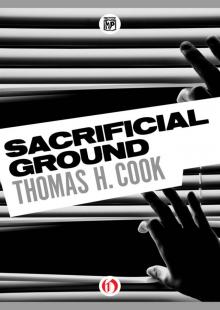 Sacrificial Ground
Sacrificial Ground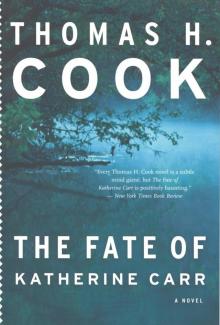 The Fate of Katherine Carr
The Fate of Katherine Carr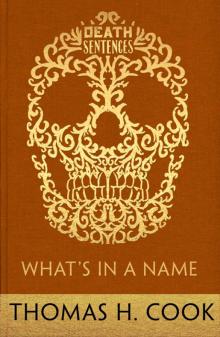 What's In A Name
What's In A Name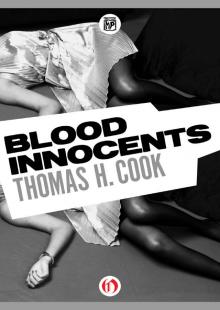 Blood Innocents
Blood Innocents Peril
Peril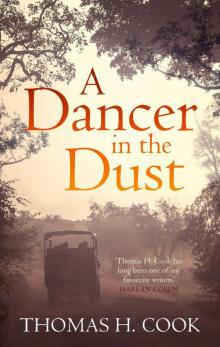 A Dancer In the Dust
A Dancer In the Dust Breakheart Hill
Breakheart Hill The Chatham School Affair
The Chatham School Affair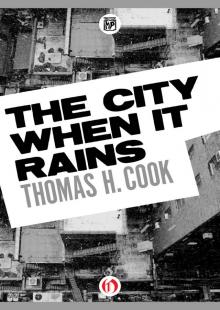 The City When It Rains
The City When It Rains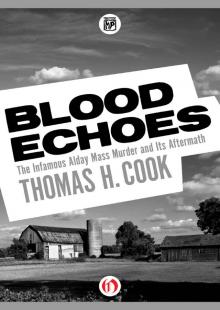 Blood Echoes
Blood Echoes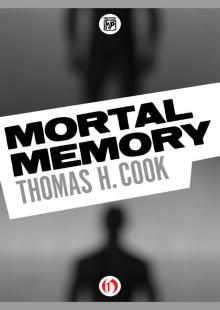 Mortal Memory
Mortal Memory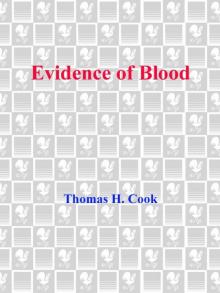 Evidence of Blood
Evidence of Blood Into the Web
Into the Web The Crime of Julian Wells
The Crime of Julian Wells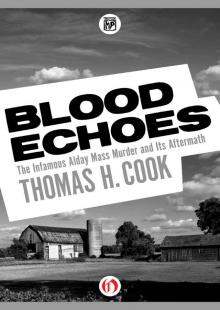 Blood Echoes: The Infamous Alday Mass Murder and Its Aftermath
Blood Echoes: The Infamous Alday Mass Murder and Its Aftermath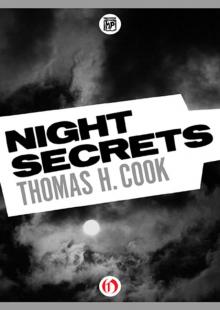 Night Secrets
Night Secrets Places in the Dark
Places in the Dark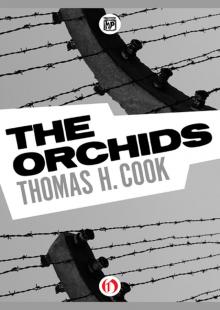 The Orchids
The Orchids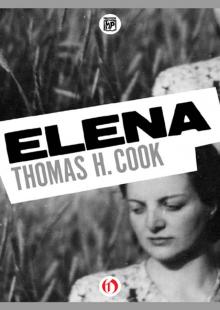 Elena
Elena Streets of Fire
Streets of Fire Instruments of Night
Instruments of Night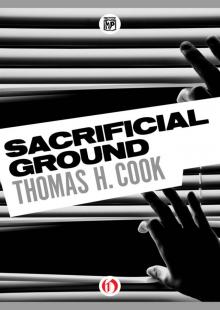 Sacrificial Ground fc-1
Sacrificial Ground fc-1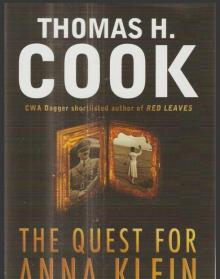 The Quest for Anna Klein
The Quest for Anna Klein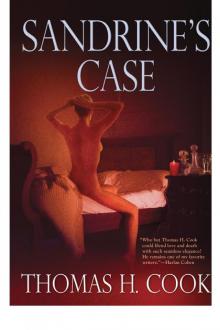 Sandrine's Case
Sandrine's Case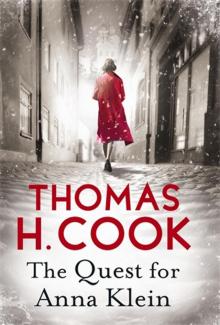 Quest for Anna Klein, The
Quest for Anna Klein, The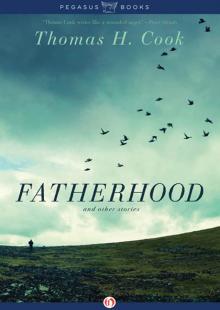 Fatherhood
Fatherhood Flesh and Blood
Flesh and Blood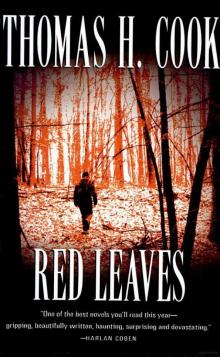 Red Leaves
Red Leaves